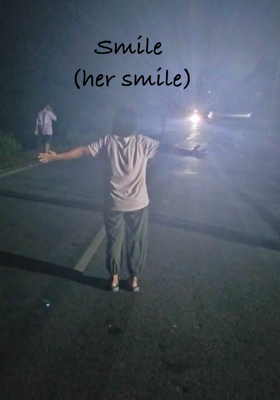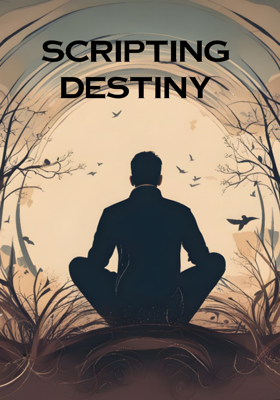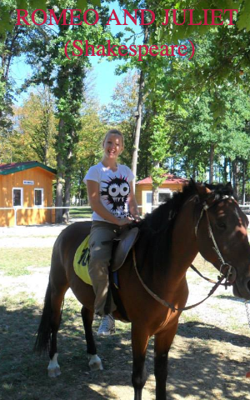The Cursed Warrior
The Cursed Warrior


The bearded ascetic stood on the top of the hillock and surveyed the carnage below him with a heavy heart. His muscular thick legs were planted like giant oaks. For once, he wasn't responsible for this brutal bloodshed, but this realization failed to lighten the dark grief in his heart, which was ever present and was always darkened by unnecessary killing of innocents. The melancholy sun was setting in the west. The warm summer breeze was eerily whispering in the distant palm trees, which were nodding their head somberly.
The ascetic hefted his heavy battle axe in his right hand and adjusted his quiver of arrows. He was taller than average and had a strong muscular body. He looked again at the desolate battlefield and turned away, his long and disarrayed locks were blowing in the evening breeze, giving him a haunting appearance. His sad eyes were brooding in contemplation of human folly. He had seen it all as he was cursed with longevity. An infinite life is not always a boon. His youthful visage belied his ancient age. The serene and handsome face was marred by a large and festering wound in the middle of his forehead from which blood was seeping. Ashwatthama was used to the eternal physical pain induced by that wound, which was nothing as compared to the mental anguish he had to go through his every single breath. He could never get used to that anguish and pain.
It seemed like yesterday that he went crying to his mother Kripi for milk as a child, after he saw a kid drinking milk, and had the cruel realization that they couldn't afford a cow. His mother couldn't bear his whimpers and daubed his lips with flour and water, so that he looked like he had drunk milk and he was pacified, not knowing the taste of milk. When his father Drona, the great sage, saw this, his heart broke. He went to his childhood friend King Drupad, who had offered him half of his kingdom when they were in school. The King laughed at the presumptions of the poor Brahmin and said, "Drona, the promises made in childhood perish with the childhood. It's contemptible that you hold them till now! You are a Brahmin, so beg as a Brahmin does and I'll see what I can spare for you." The haughty and proud Drona refused to beg and returned to his home empty handed. He chose to ignore this insult, but Ashwatthama was permanently scarred by this event and nursed a hatred towards Drupad and his entire clan. Dronacharya was a great weapons master and one of the greatest warfare teachers of his age. He was invited by his brother in law Kripacharya to teach martial arts to the princes of Hastinapur and the entire family relocated there.
Ashwatthama learned various weapons along with the princes and excelled in every kind of warfare and weapons. Ashwatthama was born with a jewel embedded in the center of his forehead, which protected him from animals, natural forces and various sicknesses, which plagued the humankind. He was a Rudra - a reincarnation of Lord Shiva - and was blessed with infinite life. Coupled with his exceptional martial sciences and physical strength, he was invincible. In spite of all these powers, he always was made fun of by the Pandava princes for being a poor Brahmin. It was then that the Kaurava Prince Suyodhan came to his rescue. Suyodhan always favored underdogs and liked people for what they were. Suyodhan had many shortcomings which earned him the despised nickname Duryodhan, but this kindness for people won him friends with undying loyalty, like Karna and Ashwatthama, who preferred to die for him than choose the winning Pandava side, which had the arch warrior Krishna.
In the conflict of egos, which caused the war of Mahabharata, Ashwatthama naturally joined arms with his childhood friend Duryodhan. One of the reasons for this coalition was that the daughter of Drupad was married to the Pandavas. His invincible powers and immortality made him arrogant and unstoppable like an angry elephant, on whom Ashwatthama was named. He, along with his father Drona, created a havoc and decimated half of the Pandava army amongst themselves.
As it was impossible to kill Ashwatthama, on the 15th day of the war, Krishna devised a plan to kill Drona by lying to him about the death of his warrior son. Drona refused to believe Krishna, who was already notorious as a liar and a cheat. He asked the eldest Pandava brother Yudhishthir for corroboration, who never lied. In the meantime, the strongest of the Pandavas Bheem killed an elephant whose name was Ashwatthama too, and declared that Ashwatthama is dead. When Drona asked Yudhishthir, he righteously said without lying: "Ashwatthama hatohatah. Naro wa? Kunjro wa?" ("Ashwatthama is indeed dead. Man? Animal?") As soon as Yudhishthir said that 'Ashwatthama is indeed dead', Krishna immediately blew his conch and everyone started cheering, so that Drona couldn't hear the other half of his reply and believed that his son was indeed dead. He laid his arms aside and got down from his chariot to meditate for the nirvana of the soul of his son. Arjun beheaded him immediately, breaking the inviolate law of war of not attacking an unarmed warrior.
Being a Rudra, Ashwatthama had inherited the legendary temper of Shiva. When he came to know of this treachery, he decided to decimate the entire lineage of Pandavas. He was brooding restlessly in the night, when he saw an owl ambush a flock of sleeping birds and got inspired. He attacked the Pandava camp at night, while everyone was asleep. The Pandavas were not in their camp that night. He ended up slaughtering their five innocent children, and then in his fit of anger, he fired the entire camp, killing everyone in it. This was in violation of another law, which decreed that the civilians should never be attacked. Furthermore, no act of hostility can be carried out after sunset. In his blind rage, Ashwatthama was beyond caring about any such fickle laws and rules.
On the 16th day of Mahabharata, Arjun attacked Ashwatthama in retaliation, but was unable to kill him due to the boon of immortality. Then Arjun used the ultimate weapon Brahmastra, which was immediately countered by Ashwatthama as well, who had learned it from his father. All the gods were horrified to see such great weapons launched as the resulting explosions would destroy the entire world. They ordered both warriors to withdraw the weapons. Arjun complied, but Ashwatthama couldn't, as he had never learned how to retract it. In his infinite malevolence and rage, he diverted the weapon towards the womb of Uttara, the widow of the slain warrior Abhimanyu, so that the Pandavas can truly be extinct.
It was a heinous and cowardly act to attack an unborn child. Krishna immediately interceded to protect the unborn foetus. The entire world was appalled by this insane act of cruelty and it was condemned by everyone, including Duryodhan and his blind father Dhritharashtra. The usually mild Krishna was blind with rage and decided to punish Ashwatthama. Considering his extreme strength and longevity, it wasn't possible to punish him in a conventional way, so Krishna forced him to give up the jewel on his forehead, which made him susceptible to all the diseases a mortal fears. It left a bleeding gash in the middle of his forehead. Krishna cursed him with the greatest curse known in the history:
"O, Ashwatthama! You will carry the burden of all the people’s sins on your shoulders and will wander alone like a ghost without getting any love or respect till the end of Kaliyuga! You will never get any rest physically or any peace mentally! You will be in total disgrace from the mankind and society! Your body will suffer from a host of incurable diseases, sores and wounds that would never heal! May you, Ashwatthama, lead the most wretched life anyone can ever imagine! May you never receive love or affection ever in your life unto the end of Time!"
Time is a curious force! Sometimes it flits faster than a thought and at times it stands still like a mountain. These events seemed like yesterday, but the period after that felt like eons! The cursed warrior tramped the banks of river Narmada, in the hope of meeting his Lord Shiva, who may have mercy on him and exonerate this curse. He always visited all the battlefields in the world, in the hope of meeting his master Mahakal, who's said to rule death and is always found in the vicinity of battlefields. He was in search of death, which meets everyone infallibly, but avoided him. Time had stood still for him.
The sun had set and a melancholy pal was setting on the battlefield, which only places with dead bodies, like graveyards or morgues can produce. Ashwatthama walked towards the end of the forest with his head bowed down. He wondered at the changes that time has brought in him. Time, the greatest healer had toned him down and sated his bloodthirst. He wondered and was pained at the blood lust of his fellow human beings. He was repentant at his own nefarious deeds and was surprised that he could even think of them! He wished that he could go back in time and change the course of history. He wished that he could stop the Mahabharata. He wished that he didn't arm the ultimate weapon to destroy the Pandavas. He wished that he didn't attack that unborn child, who hadn't harmed anyone.
Ashwatthama had reached to the end of the glade and could see the glowing city afar. Time, the ultimate magician was at work here too. The swift chariots had been replaced by fast cars. The dim oil lamps were replaced by electric bulbs, which turned nights into days. The bows and arrows were replaced by guns and bombs. What the powerful wizard time couldn't change was the human mentality. Eons after the bloody Mahabharata, the man was still as barbaric and bloodthirsty. They still were as capricious and cruel. The cursed warrior let out a tired sigh. In the last five thousand years, he had seen the man at various stages of progress, always hoping him to be a little sensible. He had seen Christ crucified by people he loved. He had seen Mohammad attacked by his own kins. He had seen Zarathrusta exiled from his own home. What he could never see was peace and bonhomie. He looked at the rising moon with tired eyes.
Ashwatthama turned away from the bloodthirsty people, who called themselves civilized and went back in his forest, where animals killed only to satiate their hunger. His ears were resonating with the screams of the Pandava kids, which created a macabre cacophony with the cries of all the innocent victims he had slain. The night with its haunting shadows had once again descended to torment him. Ashwatthama settled down under a tree to continue his never ending curse, his past acts of brutality dancing before him like demented ghosts. Mocking him. Pitying him.
The great battle axe vibrated in his hand with a malevolent glee.
---------
Ashwatthama is one of the greatest warriors of Mahabharata and is said to be one of the five people, who had the powers to prevent or end the war if they so wished. The other four were Krishna, Bhishma, Draupadi and Barbarik. Ashwatthama was considered an incarnation of Mahakal and Mahakali, thus having the enormous strength and merciless brutality. The above story is based on Shreemad Bhagavat Mahapurana. The curse by Krishna is a loose translation of what I read in Sanskrit in that epic.
Ashwatthama is believed to be alive till this day and is said to visit all the battlefields of the world, brooding and grieving the death of the brave souls slain in battles. He's said to visit a particular temple near Narmada bank everyday at 4 am. Many people have claimed to see him. It's said that he's awaiting the last incarnation of Vishnu, 'Kalki', who will end his curse.
Of all the warriors of Mahabharata, I always was intrigued by Karna, Barbarik and Ashwatthama. They always were given the short straw and were unsung. The English term 'Barbarian' is originated from the Sanskrit adjective 'Barbar', which means cruel and is derived from the name Barbarik (pron: bur-bur-ik). Barbarik was a great warrior and had the power to end the entire 18 days Mahabharata in few minutes. At the request of Krishna he allowed Krishna to behead himself on the first day of the war.
Like all myths, even the myth of Ashwatthama may be untrue, who knows! As a storyteller, it's not my place to judge, but to narrate.

























































